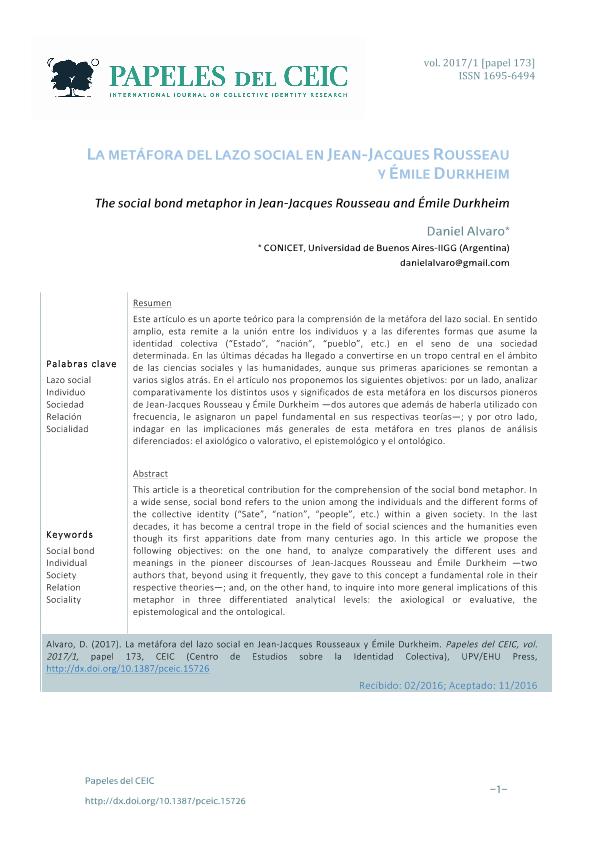Artículo
Este artículo es un aporte teórico para la comprensión de la metáfora del lazo social. En sentido amplio, esta remite a la unión entre los individuos y a las diferentes formas que asume la identidad colectiva (“Estado”, “nación”, “pueblo”, etc.) en el seno de una sociedad determinada. En las últimas décadas ha llegado a convertirse en un tropo central en el ámbito de las ciencias sociales y las humanidades, aunque sus primeras apariciones se remontan a varios siglos atrás. En el artículo nos proponemos los siguientes objetivos: por un lado, analizar comparativamente los distintos usos y significados de esta metáfora en los discursos pioneros de Jean-Jacques Rousseau y Émile Durkheim —dos autores que además de haberla utilizado con frecuencia, le asignaron un papel fundamental en sus respectivas teorías—; y por otro lado, indagar en las implicaciones más generales de esta metáfora en tres planos de análisis diferenciados: el axiológico o valorativo, el epistemológico y el ontológico. This article is a theoretical contribution for the comprehension of the social bond metaphor. In a wide sense, social bond refers to the union among the individuals and the different forms of the collective identity (“Sate”, “nation”, “people”, etc.) within a given society. In the last decades, it has become a central trope in the field of social sciences and the humanities even though its first apparitions date from many centuries ago. In this article we propose the following objectives: on the one hand, to analyze comparatively the different uses and meanings in the pioneer discourses of Jean-Jacques Rousseau and Émile Durkheim —two authors that, beyond using it frequently, they gave to this concept a fundamental role in their respective theories—; and, on the other hand, to inquire into more general implications of this metaphor in three differentiated analytical levels: the axiological or evaluative, the epistemological and the ontological.
La metáfora del lazo social en Jean-Jacques Rousseau y Émile Durkheim
Fecha de publicación:
06/2016
Editorial:
Universidad del País Vasco
Revista:
Papeles del CEIC
ISSN:
1695-6494
Idioma:
Español
Tipo de recurso:
Artículo publicado
Clasificación temática:
Resumen
Palabras clave:
INDIVIDUO
,
SOCIEDAD
,
RELACIÓN
,
SOCIALIDAD
Archivos asociados
Licencia
Identificadores
Colecciones
Articulos(SEDE CENTRAL)
Articulos de SEDE CENTRAL
Articulos de SEDE CENTRAL
Citación
Alvaro Candia, Daniel Fernando; La metáfora del lazo social en Jean-Jacques Rousseau y Émile Durkheim; Universidad del País Vasco; Papeles del CEIC; 6-2016; 1-26
Compartir




